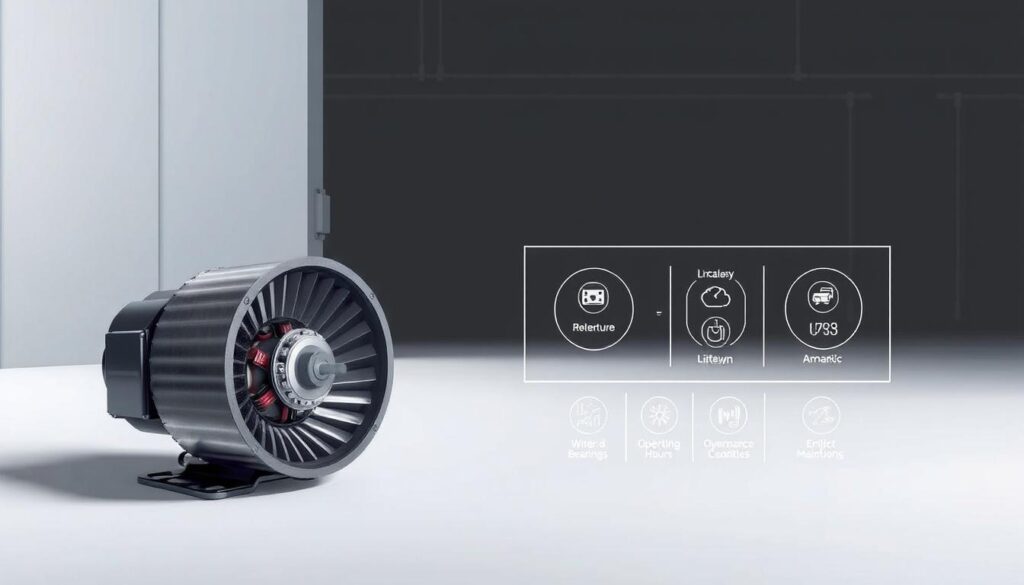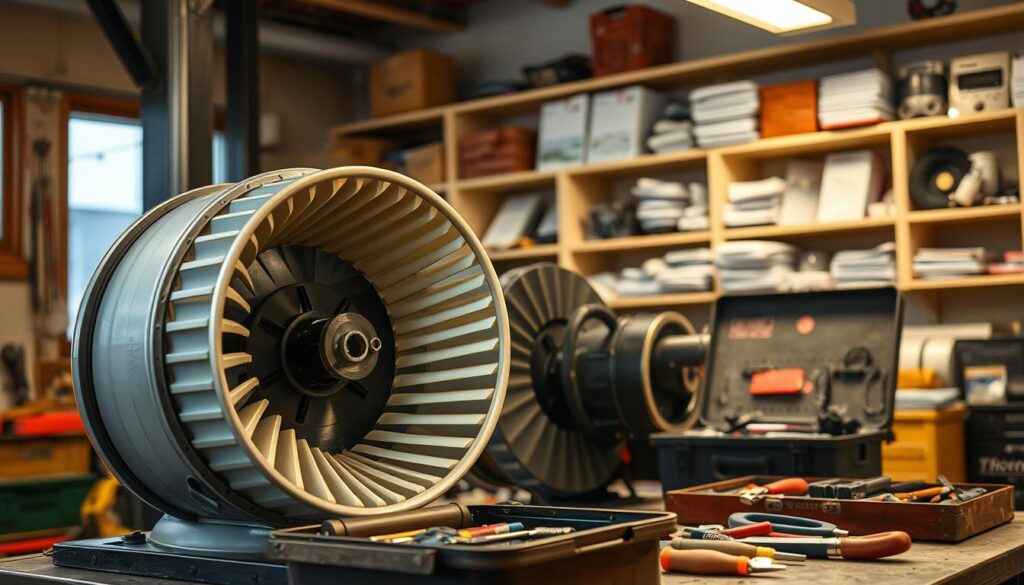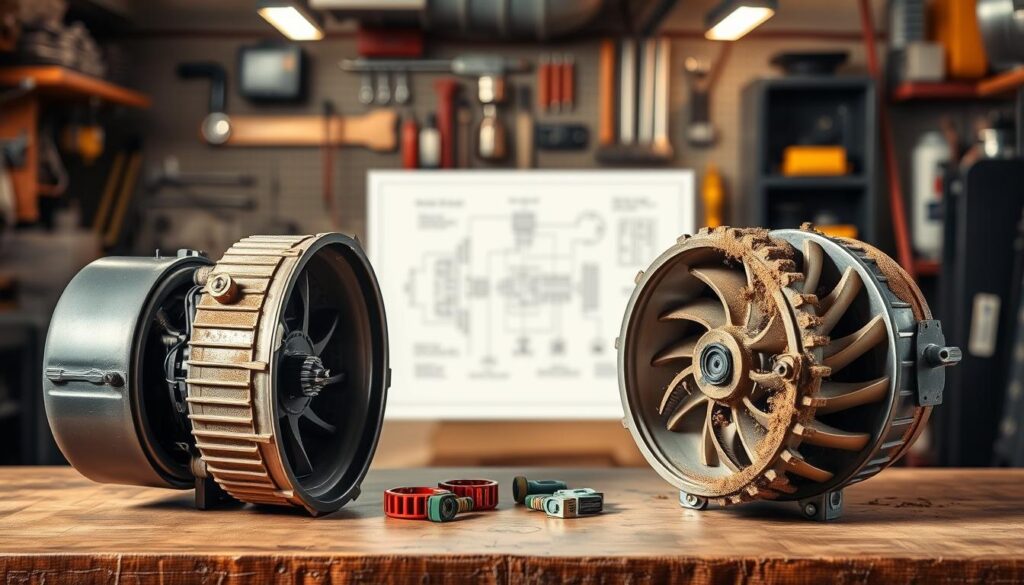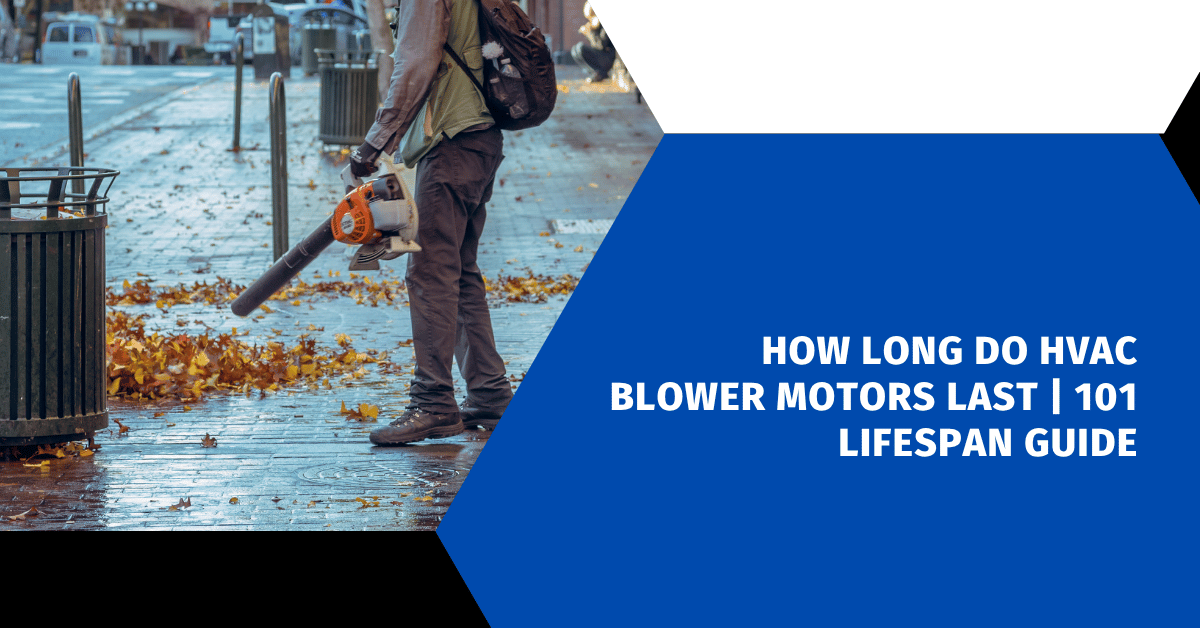Affiliate Disclosure
HVAC Guide Guys is a participant in the Amazon Services LLC Associates Program, an affiliate advertising program designed to provide a means for sites to earn advertising fees by advertising and linking to Amazon.
How Long Do HVAC Blower Motors Last? Ever thought about the heart of your home’s comfort? What makes your HVAC blower motor keep your space just right?

Your HVAC blower motor is key to airflow in your home. It lasts from 10 to 20 years, depending on care, use, and environment.
Knowing how long your blower motor lasts helps you stay ahead. Energy Star says heating and cooling use half your home’s energy. A good blower motor saves you money and keeps you comfy.
These motors are vital for air flow, temperature control, and air quality. Regular checks and upkeep can make them last longer and work better.
Key Takeaways
- Average HVAC blower motor lifespan is 10-20 years
- Maintenance significantly impacts motor durability
- Energy efficiency directly relates to motor performance
- Annual professional inspections are recommended
- Proper care can prevent premature motor failure
Table of Contents
Understanding HVAC Blower Motors and Their Function
Your home’s comfort relies on a key part: the HVAC blower motor. It’s the heart of your heating and cooling system. It keeps your home at a steady temperature and air flows well.
HVAC blower motors are vital for indoor comfort. They control airflow in your home. They move heated or cooled air through ducts, making your space comfortable.
Key Components and Operation
Knowing about hvac blower motor installation is important. These motors have important parts:
- Electric motor core
- Fan or impeller
- Electrical connections
- Mounting brackets
Performance and Efficiency Insights
HVAC blower motor efficiency changes with the motor type. Today, you can find:
- Variable-speed motors – Adjust airflow based on temperature needs
- Direct current motors – Save more energy
- Permanent split capacitor motors – Run at steady speeds
Choosing the right blower motor affects your home’s energy use and comfort. Getting it installed by pros ensures it works well for a long time.
Average Lifespan of HVAC Blower Motors
Knowing how long HVAC blower motors last is key for homeowners. They need to plan their system maintenance. The lifespan of these motors usually ranges from 10 to 20 years. This depends on several important factors.
Different HVAC systems have different lifespans for their blower motors:
- Air-Source Heat Pumps: 10-12 years
- Furnaces: 10-20 years
- Direct Expansion Air Conditioners: 15-20 years
The life of your blower motor depends on proper maintenance and operating conditions. Regular maintenance can extend its life. It might even match the lifespan of your entire HVAC system.
“A well-maintained blower motor is the heart of an efficient HVAC system”
Several factors affect how long an HVAC blower motor lasts:
- How often you use the system
- The quality of its initial installation
- Regular professional maintenance
- The environment it operates in
By investing in routine inspections and proactive maintenance, you can improve your blower motor’s performance. This can also extend its life.
Explore Our HVAC Shop
Looking for top-rated HVAC tools, parts, and accessories? Visit our shop and find the perfect solution for your needs.
Visit the ShopFactors Affecting Blower Motor Durability
Your HVAC blower motor’s life depends on many important factors. These factors can greatly affect its performance and how long it lasts. Knowing these can help you avoid early failure and keep your system running well.
Many environmental and operational conditions affect your blower motor’s life. Let’s look at the main things that matter:
Environmental Conditions
Environmental factors can really impact your HVAC blower motor. Extreme temperatures, humidity, and air quality all play a big role in its health.
- High humidity can cause internal moisture damage
- Dust and debris accumulation increases wear and tear
- Temperature fluctuations stress motor components
Usage Patterns
How you use your HVAC system affects your blower motor’s life. Running it a lot or cycling it often can make it wear out faster.
- Constant thermostat adjustments increase motor strain
- Extended continuous operation reduces motor lifespan
- Seasonal variations impact overall usage intensity
Maintenance Frequency
Regular maintenance is key to keeping your blower motor running longer. Taking care of it ahead of time can stop unexpected problems.
| Maintenance Activity | Impact on Blower Motor |
|---|---|
| Annual Professional Inspection | Reduces failure risk by 50% |
| Regular Cleaning | Improves energy efficiency by 5-15% |
| Component Lubrication | Extends motor lifespan by 15-20% |
Investing time in routine maintenance can save you significant repair and replacement costs in the long run.
Explore Our HVAC Shop
Looking for top-rated HVAC tools, parts, and accessories? Visit our shop and find the perfect solution for your needs.
Visit the ShopCommon Signs of Blower Motor Failure
Spotting early signs of hvac blower motor failure can save you money and avoid system breakdowns. Your HVAC system shows signs of trouble through various symptoms. It’s important not to ignore these signs.
- Unusual hvac blower motor noise like grinding, squealing, or rattling sounds
- Weak or inconsistent airflow from vents
- Dramatic increase in energy bills
- Frequent system cycling or complete system shutdown
- Noticeable temperature inconsistencies throughout your home
Strange noises often mean serious motor problems. Grinding or screeching might mean worn bearings. A burning smell could point to overheating parts. These signs usually show when your blower motor is in trouble and needs quick help.
“Early detection of blower motor problems can prevent complete system failure and expensive replacements.”
Your HVAC system’s performance affects your home’s comfort and energy use. If the blower motor fails, you’ll get less airflow, uneven heating or cooling, and might use more electricity.
| Symptom | Potential Cause | Recommended Action |
|---|---|---|
| Loud Grinding Noise | Worn Motor Bearings | Professional Inspection |
| No Airflow | Motor Electrical Failure | Immediate Repair/Replacement |
| Burning Smell | Motor Overheating | Stop System, Call Technician |
Regular maintenance can stop hvac blower motor failure surprises. Think about getting professional checks at least twice a year. This way, you can catch problems early and keep your system working well.
How Long Do HVAC Blower Motors Last in Different Climate Zones
The lifespan of your HVAC blower motor changes with the climate. Knowing how weather affects these parts helps you maintain them better. It also helps you know when you might need a new one.
Regional Weather Impact on Motor Durability
Climate zones put different stresses on HVAC blower motors. People in extreme areas see varied performance and lifespan.
- Hot and humid regions: Blower motors usually last 10 years due to heavy use
- Temperate zones: Motors can last up to 15 years with regular use
- Cold and dry climates: Performance depends on insulation and system efficiency
Seasonal Stress Factors
Seasonal changes affect HVAC blower motor lifespan. Running them a lot in summer or winter shortens their life.
Climate-Specific Maintenance Needs
Maintenance needs change with the climate. Regular checks and special care can add 2-3 years to your motor’s life. Look for professional tune-ups that meet your area’s needs.
Proper maintenance can help your blower motor reach its maximum lifespan in different environments.
Explore Our HVAC Shop
Looking for top-rated HVAC tools, parts, and accessories? Visit our shop and find the perfect solution for your needs.
Visit the ShopMaintenance Tips to Extend Blower Motor Life

Keeping your HVAC blower motor in good shape is key for top system performance and longer life. Proper care can make your unit last longer and work better.
Homeowners can follow several important steps for regular maintenance:
- Change air filters every 1-3 months
- Keep vents and registers clean and unobstructed
- Schedule professional inspections annually
- Listen for unusual noises that might indicate problems
Seasonal upkeep is vital to avoid early wear. Here are key tasks to keep your blower motor in top shape:
- Clean air intake areas thoroughly
- Check electrical connections
- Lubricate moving parts as recommended
- Inspect belts and pulleys for wear
Experts suggest a detailed maintenance plan to boost your system’s efficiency. Early action can add 5-10 years to your blower motor’s life.
| Maintenance Task | Frequency | Benefit |
|---|---|---|
| Air Filter Replacement | Every 1-3 months | Reduces system strain |
| Professional Inspection | Annually | Prevents major breakdowns |
| Motor Cleaning | Twice yearly | Improves efficiency |
By following these maintenance tips, you can keep your HVAC system running smoothly. This will help avoid costly repairs and keep your system efficient.
Cost Considerations for Blower Motor Replacement
Knowing the cost of replacing an hvac blower motor is key for homeowners. The price can change a lot based on several important factors.
Parts and Labor Expenses
The cost of a blower motor includes parts and labor. Residential motors can cost between $100 and $1,000. The price goes up with the motor’s horsepower:
- Single-speed motors: $150 to $450
- Multi-speed motors: $400 to $600
- Variable-speed motors: $500 to $1,000+
Investment vs. Replacement Value
Think about more than just the upfront cost of replacing a blower motor. A new motor can make your system more energy-efficient. This could lower your utility bills over time. Choosing a high-quality motor can save you money in the long run.
Insurance and Warranty Coverage
Warranty coverage can help with the cost of replacement. Some warranties cover parts, leaving you to pay for labor. Labor costs usually range from $75 to $175 per hour.
Professional tip: Always check your existing warranty before scheduling a replacement.
The whole replacement process can take 90 minutes to three hours. Costs vary from $400 to $1,250, depending on the motor and system complexity.
Explore Our HVAC Shop
Looking for top-rated HVAC tools, parts, and accessories? Visit our shop and find the perfect solution for your needs.
Visit the ShopProfessional vs. DIY Maintenance Approaches

Homeowners must decide between doing HVAC blower motor maintenance themselves or getting a professional. DIY can save money, but professionals avoid costly errors with their expertise.
DIY is good for simple tasks, but complex systems need special knowledge. Here are some points to consider:
- Simple DIY tasks that save money:
- Replacing air filters ($10-$40)
- Visual system inspections
- Cleaning external vents
- Professional services recommended for:
- Complex diagnostic procedures
- Electrical system checks
- Refrigerant level assessments
Professionals offer big advantages in HVAC maintenance. They use advanced tools to find problems that DIYers can’t see. With costs around $100-$300 a year, they can make your system last 20 years longer.
Safety is key. DIY repairs can lead to electrical shock or refrigerant exposure. Professionals know how to stay safe and have the right gear.
Getting professional maintenance can cut energy bills by 15% and stop 80% of system failures.
In the end, mixing DIY with professional help keeps your HVAC system running well, safely, and for a long time.
Energy Efficiency and Blower Motor Performance
Your home’s comfort and energy use depend on your HVAC blower motor. New blower motors are much more efficient. They help you save money and are better for the environment.
Variable-speed blower motors are a big step forward in HVAC tech. They make your system work better by:
- Adjusting airflow for your cooling and heating needs
- Using up to 45% less energy
- Keeping temperatures more even
- Being quieter than old motors
Getting a new hvac blower motor brings big benefits. These motors use less power and work better. They can save you a lot of money, helping over 60% of U.S. homes with central air.
Choosing a high-performance blower motor is smart. It saves you money in the long run and cuts down on pollution. Many utility companies give rebates for energy-saving HVAC upgrades. This makes the choice even better.
Upgrading your blower motor can lead to approximately 300 kWh annual energy savings per household.
Today’s variable-speed motors offer more than just energy savings. They also remove more humidity and last longer. This is because they work at lower speeds, which is gentler on your system.
Explore Our HVAC Shop
Looking for top-rated HVAC tools, parts, and accessories? Visit our shop and find the perfect solution for your needs.
Visit the ShopWhen to Replace vs. Repair Your Blower Motor
Choosing between replacing or fixing your hvac blower motor can be tough. It affects how well your HVAC system works and your costs over time.
Assessment Criteria for HVAC Blower Motor Repair
- Check the motor’s current age (typical lifespan is 10-20 years)
- Evaluate repair costs against replacement expenses
- Consider the system’s overall efficiency
- Inspect recent performance and maintenance history
Cost-Benefit Analysis Breakdown
The cost of fixing your hvac blower motor can change a lot. Keep these points in mind:
- Replacing the blower motor costs between $250 to $900
- Repairing it usually costs between $131 to $486
- A new furnace costs about $4,727, making repairs cheaper
Age and Efficiency Factors
Your system’s age is key in deciding to repair or replace. If your HVAC system is over 12-15 years old, it might be better to replace it. New systems use less energy and can save up to 2.5 tons of carbon dioxide each year.
Pro Tip: Consider replacement if repair costs exceed 50% of a new system’s price.
Getting advice from a professional HVAC technician can help. They can give you advice based on your system and home.
Conclusion
Knowing how long HVAC blower motors last is key to keeping your home comfy. A well-kept blower motor can last 10 to 20 years. But, it all depends on how well you take care of it and when you act fast.
Keeping your HVAC blower motor in top shape is all about being proactive. Regular checks, professional services, and quick action to any issues can make it last longer. Even though replacing it might cost $300 to $1,500, regular upkeep can prevent sudden failures and save energy.
Choosing energy-efficient motors can save you money in the long run. These motors adjust their speed to use less energy, cutting down on your bills. Always remember, getting help from a pro is better than trying to fix it yourself. DIY fixes can end up costing more if done wrong.
Your HVAC system’s health is a big deal for your home’s comfort and energy use. By keeping up with your blower motor, investing in quality care, and making smart replacement choices, you can have a reliable and energy-saving climate control system for years.

